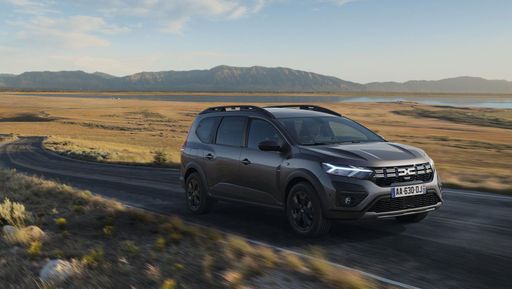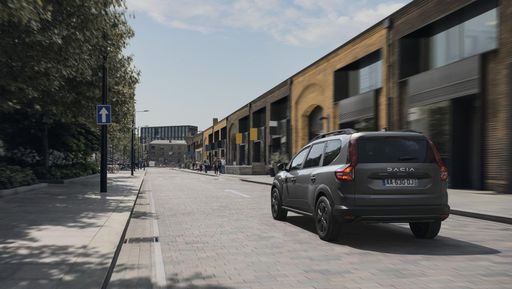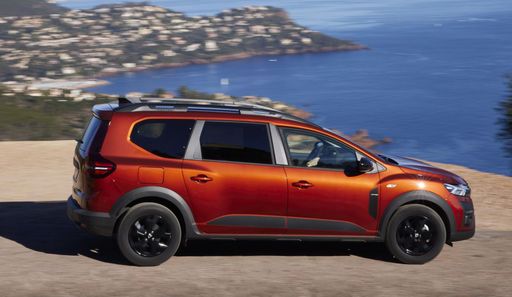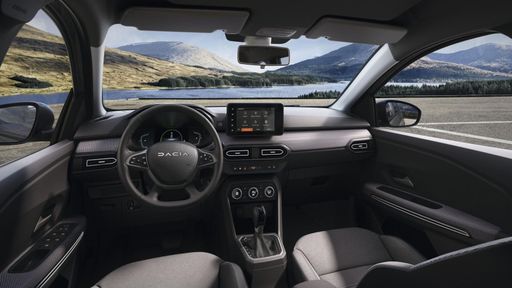Dacia Jogger VS Peugeot 208 – Specs, Efficiency & Price Comparison
Which model is the better choice – the Dacia Jogger or the Peugeot 208? We compare performance (140 HP vs 156 HP), boot capacity (607 L vs 352 L), efficiency (4.70 L vs 14.10 kWh4.50 L), and of course, the price (15400 £ vs 20200 £).
Find out now which car fits your needs better!
The Dacia Jogger (MPV) is powered by a Full Hybrid, LPG or Petrol engine and comes with a Automatic or Manuel transmission. In comparison, the Peugeot 208 (Hatchback) features a Petrol, Electric or Petrol MHEV engine and a Manuel or Automatic gearbox.
When it comes to boot capacity, the Dacia Jogger offers 607 L, while the Peugeot 208 provides 352 L – depending on what matters most to you. If you’re looking for more power, you’ll need to decide whether the 140 HP of the Dacia Jogger or the 156 HP of the Peugeot 208 suits your needs better.
There are also differences in efficiency: 4.70 L vs 14.10 kWh4.50 L. In terms of price, the Dacia Jogger starts at 15400 £, while the Peugeot 208 is available from 20200 £.
Compare all the key specs now and find out which model fits your lifestyle best!
Dacia Jogger
The Dacia Jogger offers a spacious and versatile interior, making it an excellent choice for families seeking practicality and comfort. Its design combines the robustness of an SUV with the functionality of an estate, providing a reliable option for various driving needs. With a focus on affordability, the Jogger ensures that essential features are accessible without compromising on quality.
details @ dacia-presse.de
@ dacia-presse.de
 @ dacia-presse.de
@ dacia-presse.de
 @ dacia-presse.de
@ dacia-presse.de
 @ dacia-presse.de
@ dacia-presse.de
Peugeot 208
The Peugeot 208 exudes a distinctive French charm, combining sleek lines with an assertive stance on the road. Inside, it offers a modern and sophisticated cabin, complete with intuitive technology and high-quality finishes to enhance the driving experience. Its agile handling and efficient performance make it a delightful choice for both city commuting and longer journeys.
details @ www.media.stellantis.com
@ www.media.stellantis.com
 @ www.media.stellantis.com
@ www.media.stellantis.com
 @ www.media.stellantis.com
@ www.media.stellantis.com
 @ www.media.stellantis.com
@ www.media.stellantis.com

|

|
|
|
|
Costs and Consumption |
|
|---|---|
|
Price
15400 - 23400 £
|
Price
20200 - 35100 £
|
|
Consumption L/100km
4.7 - 7.7 L
|
Consumption L/100km
4.5 - 5.2 L
|
|
Consumption kWh/100km
-
|
Consumption kWh/100km
14.1 - 15.4 kWh
|
|
Electric Range
-
|
Electric Range
362 - 432 km
|
|
Battery Capacity
0.60 kWh
|
Battery Capacity
46 - 51 kWh
|
|
co2
105 - 137 g/km
|
co2
0 - 117 g/km
|
|
Fuel tank capacity
40 - 50 L
|
Fuel tank capacity
44 L
|
Dimensions and Body |
|
|---|---|
|
Body Type
MPV
|
Body Type
Hatchback
|
|
Seats
5 - 7
|
Seats
5
|
|
Doors
5
|
Doors
5
|
|
Curb weight
1251 - 1460 kg
|
Curb weight
1165 - 1530 kg
|
|
Trunk capacity
160 - 607 L
|
Trunk capacity
309 - 352 L
|
|
Length
4547 mm
|
Length
4055 mm
|
|
Width
1784 mm
|
Width
1745 mm
|
|
Height
1674 mm
|
Height
1430 mm
|
|
Payload
393 - 582 kg
|
Payload
380 - 430 kg
|
Engine and Performance |
|
|---|---|
|
Engine Type
Full Hybrid, LPG, Petrol
|
Engine Type
Petrol, Electric, Petrol MHEV
|
|
Transmission
Automatic, Manuel
|
Transmission
Manuel, Automatic
|
|
Transmission Detail
Automatikgetriebe, Schaltgetriebe
|
Transmission Detail
Schaltgetriebe, Automat. Schaltgetriebe (Doppelkupplung)
|
|
Drive Type
Front-Wheel Drive
|
Drive Type
Front-Wheel Drive
|
|
Power HP
91 - 140 HP
|
Power HP
101 - 156 HP
|
|
Acceleration 0-100km/h
9.8 - 13.2 s
|
Acceleration 0-100km/h
8.3 - 10.9 s
|
|
Max Speed
167 - 174 km/h
|
Max Speed
150 - 200 km/h
|
|
Torque
160 - 200 Nm
|
Torque
205 - 270 Nm
|
|
Number of Cylinders
3 - 4
|
Number of Cylinders
3
|
|
Power kW
67 - 103 kW
|
Power kW
74 - 115 kW
|
|
Engine capacity
999 - 1598 cm3
|
Engine capacity
1199 cm3
|
General |
|
|---|---|
|
Model Year
2024 - 2025
|
Model Year
2023 - 2025
|
|
CO2 Efficiency Class
C, D
|
CO2 Efficiency Class
D, A, C
|
|
Brand
Dacia
|
Brand
Peugeot
|
Dacia Jogger
Introducing the Dacia Jogger: A New Era of Affordable Versatility
The Dacia Jogger has revolutionised the automotive industry by combining practicality and cost-efficiency with innovative features. This multi-purpose vehicle is perfect for families and adventurers alike, offering remarkable versatility alongside a competitive pricing strategy.
Powertrain Options: A Broad Spectrum of Choice
Dacia provides a range of powertrain options to cater to diverse preferences. The Jogger comes equipped with a selection of full-hybrid and turbocharged petrol engines. The full-hybrid version delivers a robust output of up to 140 PS, coupled with an impressive fuel efficiency of 4.7 to 4.8 L/100km. For those preferring a conventional setup, the ECO-G petrol engines offer up to 110 PS, promising a reliable and economical drive with a fuel consumption ranging from 5.7 to 7.7 L/100km.
Innovation in Every Journey
One of the notable innovations in the Jogger is its intelligent use of space. The model boasts a generous seating capacity, comfortably accommodating 5 to 7 passengers, depending on the configuration. With features like adjustable seats and a large boot space extending up to 607 litres, the Jogger is designed to handle anything from family vacations to transporting bulky items.
Design and Comfort: More than Meets the Eye
The Dacia Jogger showcases a modern design, with a robust and aerodynamic silhouette. Measuring 4547 mm in length, it strikes a balance between spaciousness and manoeuvrability. The comfort of the Jogger is enhanced by its well-crafted interior, offering various amenities across different trim levels, including Expression and Extreme, available in both five and seven-seater configurations.
Performance and Handling: Tailored for Every Terrain
Equipped with front-wheel drive and a choice between manual and automatic transmissions, the Jogger assures a smooth driving experience. Its engines, offering up to 103 kW (140 PS), ensure adequate power delivery, while the model accelerates from 0-100 km/h in just under 10 seconds. With a top speed of up to 174 km/h, the Jogger is well-suited for both urban and highway driving.
Affordability and Economy: A Balanced Proposition
Dacia continues to uphold its reputation for affordability with the Jogger, offering a competitive price range between €17,900 and €26,400. This pricing, combined with low maintenance and operating costs, makes the Jogger a highly attractive option in the MPV market. Its monthly costs are estimated between €701 and €821, ensuring outstanding value for budget-conscious consumers.
Conclusion: The Versatile Choice
The Dacia Jogger is a vehicle that offers practicality, efficiency, and innovation without breaking the bank. With its diverse range of configurations and features, it is aptly capable of meeting a wide array of needs, whether for family tasks or everyday adventures. The Jogger is more than just a means of transportation; it is a testament to Dacia’s commitment to delivering quality and value.
Peugeot 208
A Glimpse into the Future: The New Peugeot 208
The Peugeot 208, with its sleek design and innovative features, continues to set benchmarks in the automotive industry. As a hatchback, it seamlessly blends style with practicality, offering the perfect solution for urban driving and long-distance travels alike. In this article, we delve into the technical details and innovations that distinguish the latest iterations of the Peugeot 208.
Engine Options: Efficiency Meets Performance
The Peugeot 208 provides an array of engine options catering to different driving preferences. Featuring both petrol Mild-Hybrid technology and full electric powertrains, it offers a versatile range designed to accommodate eco-conscious drivers as well as those who prioritise performance.
With power outputs ranging from 101 PS to 156 PS, and a torque span of 205 Nm to 270 Nm, these machines are meticulously engineered to provide thrilling yet efficient drives. The petrol versions utilise a three-cylinder 1199 cm³ engine, optimising fuel consumption between 4.7 and 5.4 L/100km, while the electric e-208 models boast an impressive range of up to 410 km on a single charge.
Advanced Transmission Systems
The Peugeot 208 models come equipped with an advanced automatic transmission system, employing either a dual-clutch automatic gearbox or a manual transmission, depending on the chosen variant. These systems guarantee smooth gear transitions, thus enhancing driving pleasure and overall efficiency.
Performance and Environmental Considerations
From a performance standpoint, the Peugeot 208 impresses with its ability to accelerate from 0 to 100 km/h in between 8.3 to 10.9 seconds, depending on the model chosen. This level of performance is complemented by a top speed ranging from 150 to 200 km/h, ensuring that the 208 is more than capable of holding its own on the motorway.
With environmental consciousness at the forefront, the vehicle's CO2 efficiency class ranges from A to D, further establishing the Peugeot 208 as a responsible option for modern drivers keen on reducing their carbon footprint.
Comfort and Practicality: A Class Act
The interior of the Peugeot 208 reflects its exterior's stylish flair. It comfortably seats five passengers and offers a boot capacity of 265 to 309 litres, accommodating both city commutes and weekend getaways. Advanced comfort features and a state-of-the-art infotainment system ensure that rides are as enjoyable for passengers as they are for the driver.
Cost Considerations
The Peugeot 208 manages to strike a remarkable balance between cost efficiency and luxury. With prices ranging from €22,950 to €40,825, there is a variant to suit most budgets while still providing a premium experience. Additionally, the monthly costs and costs per kilometre are kept in check, making it an economically sound choice in the long term.
Dimensions and Design: Compact yet Spacious
Measuring 4,055 mm in length, 1,745 mm in width, and 1,430 mm in height, the Peugeot 208 maintains a compact profile that is perfectly suited to tight urban environments. Despite its manageable size, it offers ample space inside, thanks in part to clever design and engineering.
Conclusion: A Future-Proof Choice
The Peugeot 208 is a testament to modern automotive innovation. Whether powered by traditional engines or fully electric powertrains, it consistently delivers on performance, efficiency, and style. The combination of cutting-edge technology and sustainable practices places the Peugeot 208 as a forward-thinking choice for drivers seeking a vehicle that epitomises the best of contemporary motoring.
The prices and data displayed are estimates based on German list prices and may vary by country. This information is not legally binding.
